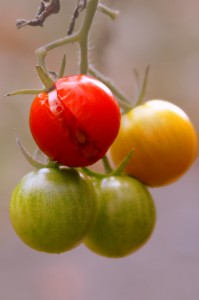Author’s note: This would seem to be the week for vegetables I hated as a kid. Yesterday was onion, today tomato, if there’s a story about brinjal/eggplant in the next few days we’ll have hit all the big ones. 😉
I was recently pointed to an early publication paper that went up on the Proceedings of the National Academy of Sciences website on Monday, where a research group at India’s National Institute of Plant Genome Research describes two genes from tomato that, when knocked down by RNAi*, result in tomatoes that can remain ripe but not spoiled for up to three times as long as tomatoes where these two genes function normally.
Their approach targets specific genes involved in breaking down certain proteins found in the cell walls of tomatoes (in fact in the cell walls of all plants). Breaking down the cell wall is a key part of ripening in fruits (which the tomato is, botanically if not culinarily). Which makes sense if you’ll think about it for a moment. One of the traits we associate with ripening is getting softer, from bananas to peaches if it’s still crunchy when you bite into it, it wasn’t ripe. What makes plants stiff and crunchy? The strength of their cell walls. Since, unlike vegetables, fruits WANT to be eaten**, as they ripen they begin to break down their cell walls to make themselves more appealing to passing animals. Unfortunately, ripening and spoiling are, in a lot of ways, the same process. If fruits aren’t eaten when they become ripe, they continue to get softer, transitioning from delicious looking -> unappetizing -> inedible -> a puddle of mush on your kitchen counter.
Preventing ripening entirely is relatively easy, and there are plenty of known mutants in tomatoes and other species that never ripen (these naturally mutant tomatoes stay green and hard no matter how long you wait). But getting part of the way to ripeness but stopping before crossing the line into spoiled is a much less tractable problem. (more…)
